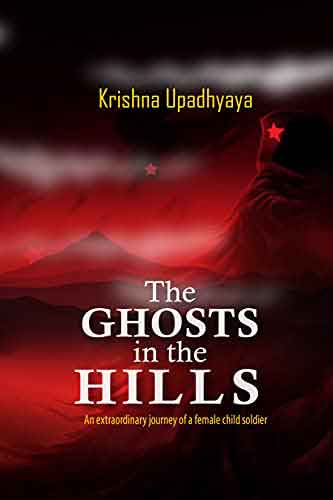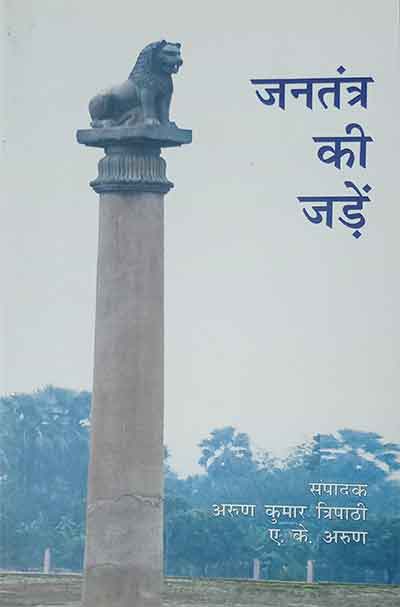Dr. Krishna Upadhyaya, a fellow traveller in the struggles for emancipation of bonded labourers in Nepal, in his latest Novel ‘The Ghosts in the Hills’ ventures to deep dive into the important but less narrated phase of Nepal’s recent history, the Maoist uprising. It falls within the genre of historical novels. It is not a factual narrative of the Maoist uprising but a creative adaptation of the historical context in which the essential qualities – hopes, aspirations, actions, mannerisms, habits, ideas, idiosyncrasies, and dejections – of the characters who participates in the Maoist uprising gets defined. It is not a political treatise, but the author attempts to articulate a political vision through the dialogues of the characters and their soliloquies.
 The novel is set in a period ranging from the early 1990’s, the beginnings of the Maoist insurrection in Nepal, and slips into the two following decades, at the end of which the revolutionary Maoist leaders opt for a Parliamentary form of democracy. Author creates the linkages to the actual events with contextual one-time references like establishment of constitutional monarchy in 1990, the 40-point demands put forward to the government by Baburam Bhattarai in 1996, Maoists declaring truce in 2006, election victory for Maoists in 2008, Prachanda becoming Prime Minister in 2008 and the dissolution of the Parliament by Prime Minister Oli in December 2020. However, the book is not a realistic chronological account of the Nepal’s history and Maoist Revolutionary movement, and neither is it the story of the main leaders of the Maoist movement. Author uses these milestones to indicate how the great events in the historical period impacted on the private lives of fictional individuals.
The novel is set in a period ranging from the early 1990’s, the beginnings of the Maoist insurrection in Nepal, and slips into the two following decades, at the end of which the revolutionary Maoist leaders opt for a Parliamentary form of democracy. Author creates the linkages to the actual events with contextual one-time references like establishment of constitutional monarchy in 1990, the 40-point demands put forward to the government by Baburam Bhattarai in 1996, Maoists declaring truce in 2006, election victory for Maoists in 2008, Prachanda becoming Prime Minister in 2008 and the dissolution of the Parliament by Prime Minister Oli in December 2020. However, the book is not a realistic chronological account of the Nepal’s history and Maoist Revolutionary movement, and neither is it the story of the main leaders of the Maoist movement. Author uses these milestones to indicate how the great events in the historical period impacted on the private lives of fictional individuals.
The author seems to be asking three questions: one, whether Maoist revolution achieved its intended objectives; two, whether the method adopted by the revolutionaries justifies the aims that they strived for; and three, what could be a way forward.
Krishna chooses to explore these from the life of Janaki, an epitome of a multi-dimensional deprivation in Nepali society. Janaki, a female, belongs to the Dalit community, the lowest in the social segmentation and are considered untouchables by the rest of the society. Her family does not have land and are historically bonded (enslaved) to the landlord. None in her community is educated. The community to which she belongs does not have a collective voice and does not have political representations. Her house is in the Sarki village, where untouchable people of Sarki caste lives, which is part of Diyale village, where Tharus, landless tenant peasants also live. She lives with her mother as her father was killed by Royal Nepal Army (RNA) suspecting him to be a Maoist, and her brothers getting drowned in the river.
Tracing the unbelievable journey of Janaki, of about 20 years, the novelist introduces the reader through the agrarian relations, the over dominance of casteism in society, the compelling transforming vision of Maoists and their processes of recruitment, training in the forest, violent armed struggle, final political compromise, and the realisation that nothing has substantially changed at the ground level even after erstwhile revolutionaries are now in the seat of power.
Krishna developed Janaki as the protagonist to suggest that the marginalised and the excluded, the emancipation and liberation of whom, are the objectives of and their participation an imperative of revolutionary action, in the final resolution they might be left out in all respects. The story has been woven in such a way that it appears that everyone, except a few characters, are antagonists, especially the leaders of the Maoist insurgency and the political elites. Janaki stands uniquely in the struggle against the system characterised by inequality, casteism, opportunism, deceit and corruption.
Janaki’s journey begins from her forced recruitment as a child solider at an early age of 10 when Maoist cadres stormed her school and abducted children into the forest to prepare them towards janabadi shikshya, a democratic education which was possible only in the new democracy.
Before that, the Maoist Party and leadership were set up in in the village by sensitized individuals from the Khatris, Pandeys, Basnets and the Chaudharys of the village and affirmed the strategies to be adopted. They concluded, ‘after we remove the monarchy and establish the New Democracy, the tillers will have land distributed to them. With this, poverty will be the thing of the past.’ They also decided, ‘we need an organization each of children, women, peasants and labourers all under the revolutionary banner of the Maoist party! The Organization to fight against the king’s rule’. The Party arrogated to itself the right to punish the oppressor landlords by burning their properties, confiscating their land and giving it to the tillers, to punish the police informers, those who disobeyed party orders to stop selling alcohol, those who discriminated against Dalits in the villages and those who practised polygamy.
In the forest, Janaki became part of the Maoist Cultural Troupe with the children to ‘spread Maoist ideas among ordinary people through their songs and dances’. Janaki, as a 13-year-old, shreds her moral and political dilemma to adopt violent revolutionary methods by assassinating Sailo, an aid of a landlord who had killed innocent peasants, in a fit of compulsive anger during an insurrectionary exercise along with Maoist cadres. Hailed as a courageous comrade, she becomes a member of the Communist Party and subsequently she moves up in the hierarchy of Peoples Liberation Army (PLA), as a combatant, learning how to use firearms, leading teams that loot Banks, destroy government offices, annihilate enemies, and attack police and military posts.
While narrating the forest-centred training and insurgency, the author affirms the ethical uprightness of the PLA cadres and the commandants. In the forest, children are safe in the forest, there is equality between men and women and there are no caste discriminations. Even outside, they insisted on coming clean at a personal level. They convinced Bharat Chaudhary to act against his sister-in-law and punish her for allegedly selling liquor so that he could act against others. Cadres of Revolutionary Women’s Organisation questioned Janaki’s father for beating her mother when he was drunk.
However, Janaki realises that the facade of the thin veneer cracking once the Maoists declare truce and subsequently become part of electoral democracy. At a personal level, she realises that she was sent to the city from the forest for sexual pleasures of her commandant, promised marriage and finally ditched her on caste grounds. At the social and political level, she realises that at her village, in 2006, the high caste and landed aristocracies talking less of ‘land to the tiller’ and more of making money through selling tress, capturing land and selling river bed sands and worst of all, following caste rules justifying action by calling it as traditional culture. Her former PLA comrades even disallowed her to serve tea to elderly landlords and local priests who assembled in their house.
A central concern of the author is the search for the purpose of one’s existence and of the actions one undertakes in pursuit of revolutionary transformation of society, expressed mainly as Janaki’s contemplations. On her fiancée’s death in the encounter, she felt that for every person she mourned, there was another person that she killed. “…death awaited everyone, including her.” Kanchipurna, another Dalit Maoist insurgent reflects while in conversation with Janaki, ‘because we know our guns will make us very powerful, and we may behave the same way as the powerful lords do’,
What is the alternative? Realising that ‘the revolution was led by the rich, fought by the poor, for the rich’, the search is for an alternative, not at a macro political level, but at a personal level – to find meaning for one’s existence and adopt purposeful action. After resigning from the Diyale school as a teacher, Janaki team up with other disgruntled women comrades to launch ‘Five Women’ FM radio station in the city (Tulasipur), initiate her programme ’good guys bad guys’ to expose corruption, gender violence, child abuse, land grab by the erstwhile revolutionaries who are now in power in Kathmandu. Her programs were so impactful that two of her Maoist insurgent leaders were defeated in the parliamentary elections, many children rescued, women liberated. This peaceful systemic transformation is revolution for Janaki, an alternative to the murderous strategies she had followed as a Maoist cadre.
Krishna Upadhyaya also probes the meaning and purpose of life and the meaning of human action from a spiritual dimension. Kanchipurna, whom Janaki meets with her mother in a temple, tells her that love and compassion are where you don’t feel discriminated and that there is no discrimination in love, if it is genuine love. Invoking Budha, he says that power does not have to be violent, and that Janaki has power as she has been fighting injustice and violence without violence through her radio program. Purpose of life is to be in the service of the people selflessly, which will also have an impact on future generations as in the case of Budha. Janaki publishes the story of ‘Good Guys and Bad Guys’, good guys being the children trekking in the forest, who all perished and bad guys are the leaders who did not deliver what was deliverable.
Krishna brings in a teleological twist to the narration, when he tells the story of how in 2020, at the age of 31, Janaki was killed hurling bomb at her and how her body was lying in a big hole on the ground in the veranda of her house. Author brings in the imagery of ‘rebellious’ Sita (Janaki) of Valmiki’s Ramayana who chose to enter the earth, to portray the courageous death of ‘rebellious’ Janaki of Sarki village.
J John is one of the founding editors of the English bi-monthly ‘Labour File’.
GET COUNTERCURRENTS DAILY NEWSLETTER STRAIGHT TO YOUR INBOX
















































